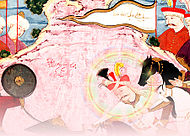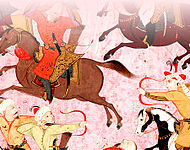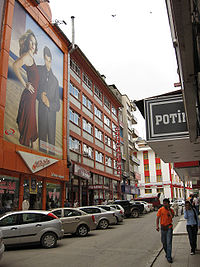- Sivas massacre
-

Beliefs Haqq-Muhammad-Ali
Four Doors · Al-Insān al-Kāmil
Qur'an · Buyruks
Wahdat al-wujud
(Sufi metaphysics)
Zahir · BatinPractices Fasting · Sama · Music
Zakat · Ziyarat · Taqiyya
Düşkünlük Meydanı
Nowruz · Ashura
HıdırellezThe Twelve Imams Ali · Hasan · Husayn
al-Abidin · al-Baqir · al-Sadiq
al-Kadhim · ar-Rida · al-Taqi
al-Naqi · al-Askari · al-MahdiFigures Muhammad-Ali · Khatai
Ibn ʿArabī · Mansur Al-Hallaj
Ahmed Yesevi · Hacı Bektaş-ı Veli
Yunus Emre · Kaygusuz Abdal
Imadaddin Nasimi · Balım Sultan
Pir Sultan · Fuzûlî · Kul Nesîmî
Otman Baba · Gül BabaLeadership Groups Khurramites · Kızılbaş
Zahediyeh · Safaviyya
Hurufiyya · Nuktawiyya
Ismailiyya · Alavi Bohra
Bektaşi · Jelali · Ni'matullāhī
Malamatiyya · Qalandariyya
Alians · Alawites · Ishikism
The Sivas massacre (Turkish: Madımak Olayları or Sivas Katliamı) refers to the events of July 2, 1993 which resulted in the deaths of 37 people, mostly Alevi intellectuals, and two hotel employees. Two people from the mob were also dead. The victims, who had gathered for a cultural festival in Sivas, Turkey, were killed when a mob of radical Islamists set fire to the hotel where the group had assembled.
Contents
Arson attack
The attack took place not long after traditional Friday prayers, when the mob broke through police barricades to surround the Otel Madımak, where artists, writers and musicians had gathered to celebrate 16th century Alevi poet Pir Sultan Abdal. Reportedly angered by the presence of Aziz Nesin, a writer who had translated and published extracts from Salman Rushdie's The Satanic Verses, the enraged fundamentalists surrounded the hotel, shouting "Death to the infidel!"[1] and threatening the assembled artists with lynching.[2] The hotel was set alight, and the fire claimed 35 lives, including those of musicians, poets, tourists and hotel staff, while assembled police did nothing to intervene.[3] Aziz Nesin was able to escape only because attackers initially failed to recognize him. According to reports, when rescuers eventually realized his identity, he was beaten by firemen while a city councilman, Cafer Özçakmak, from the Welfare Party shouted, "This is the devil we should have really killed."[1]
Aftermath
The event was seen as a major assault on free speech and human rights in Turkey, and significantly deepened the rift between religious and secular segments of the society. After lengthy court proceedings, the State Security Court sentenced 33 people to death on 28 November 1997 for their roles in the massacre; 31 of these sentences were upheld in a 2001 appeal.[4] When Turkey overturned the death penalty just over a year later in 2002, the sentences were commuted to life imprisonment.
Each year on the anniversary of the massacre, demonstrators hold protests and vigils to commemorate the victims of the fire.[5] Many wish to see the hotel, which has since re-opened, declared a memorial and turned into a museum.[6] In 2008 a government minister indicated that it would be turned into an Alevi cultural center,[7] but this has yet to occur. In June 2010, the Minister of Work and Social Security announced that the money for buying the hotel had been transferred, and that the Ministry would provide additional resources for restoration.[8] Following the court ruling on 23 November 2010, Madimak Hotel has become a public entity for a compensation of 5,601,000 TL to the hotel owners.[9]
See also
- List of massacres in Turkey
References
- ^ a b Onaran, Yalman (November/December 1994). "Burned: An Author Charged with Inciting a Crowd to Kill Him" (– Scholar search). Columbia Journalism Review XXXIII (4): 16. Archived from the original on 2008-04-27. http://web.archive.org/web/20080427044802/http://findarticles.com/p/articles/mi_qa3613/is_/ai_n8726563. Retrieved 2008-04-17.[dead link]
- ^ "40 Killed in a Turkish Hotel Set Afire by Muslim Militants", New York Times, 3 July 1993. Accessed 20 January 2008.
- ^ Kinzer, Stephen. Crescent & Star: Turkey Between Two Worlds. New York: Farrar, Straus and Giroux. p. 64. ISBN 0374131430.
- ^ Frantz, D. "Turkey's Choice: European Union or the Death Penalty" New York Times, 30 May 2001. Accessed 21 January 2008.
- ^ "Turkey commemorates 15th anniversary of Sivas massacre". Hürriyet. 2008-07-02. http://www.hurriyet.com.tr/english/domestic/9331717.asp. Retrieved 2008-07-02.
- ^ Guvenc, Duygu; Sonmez, Selahattin (2007-07-03). "Thousands gather in Sivas to commemorate Madimak Massacre". Turkish Daily News (Hürriyet). http://arama.hurriyet.com.tr/arsivnews.aspx?id=-609243. Retrieved 2008-04-17.[dead link]
- ^ Dinc, Ahmet (2008-12-27). "State to convert Madımak Hotel into cultural center". Today's Zaman. http://www.todayszaman.com/tz-web/detaylar.do?load=detay&link=162446. Retrieved 2008-12-27.
- ^ "Turkish gov't buys hotel site of Alevi massacre". Hürriyet Daily News. June 17, 2010. http://www.hurriyetdailynews.com/n.php?n=turkish-govt-seizes-hotel-where-many-alevis-intellectuals-were-killed-2010-06-17. Retrieved June 17, 2010.
- ^ http://www.sabah.com.tr/Gundem/2010/11/23/madimak_oteli_devletin_oldu#
External links
Categories:- 1993 in Turkey
- Massacres in Turkey
- Alevi massacres
- History of Sivas
Wikimedia Foundation. 2010.

